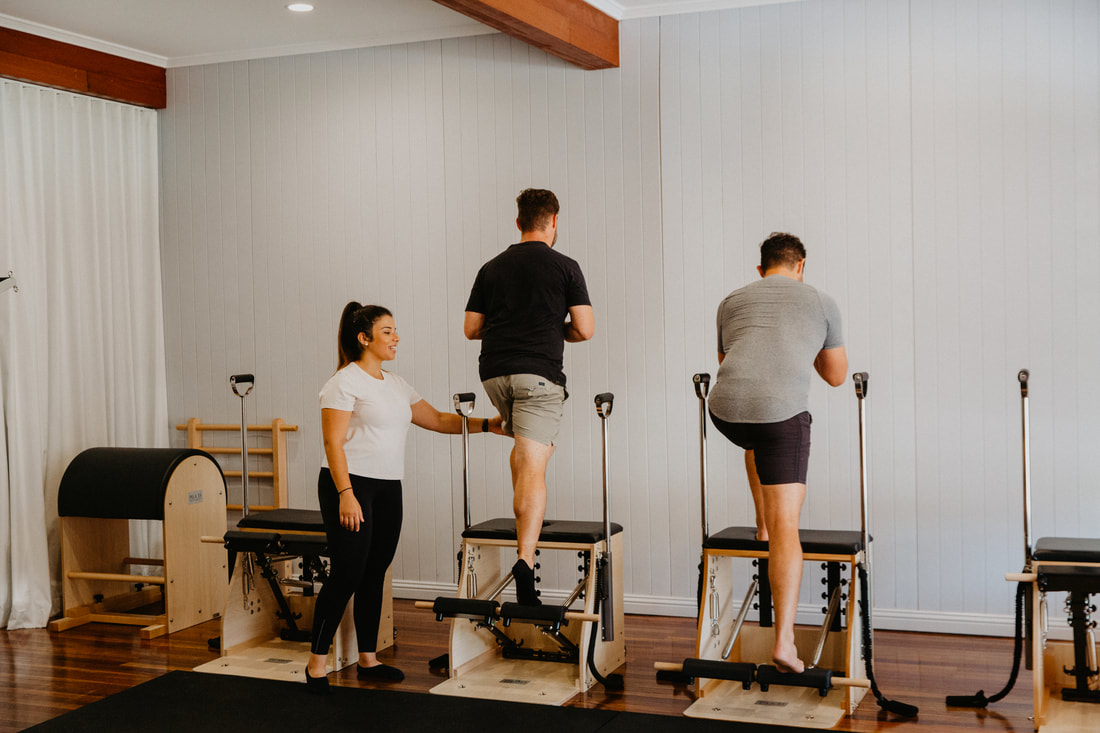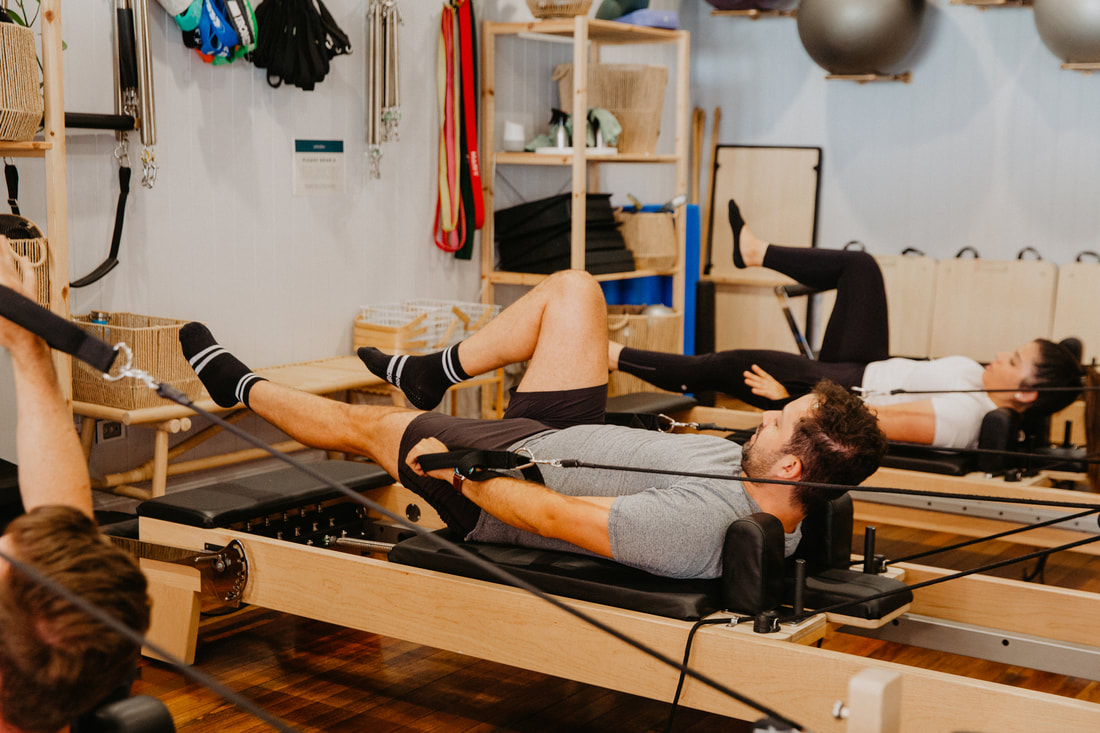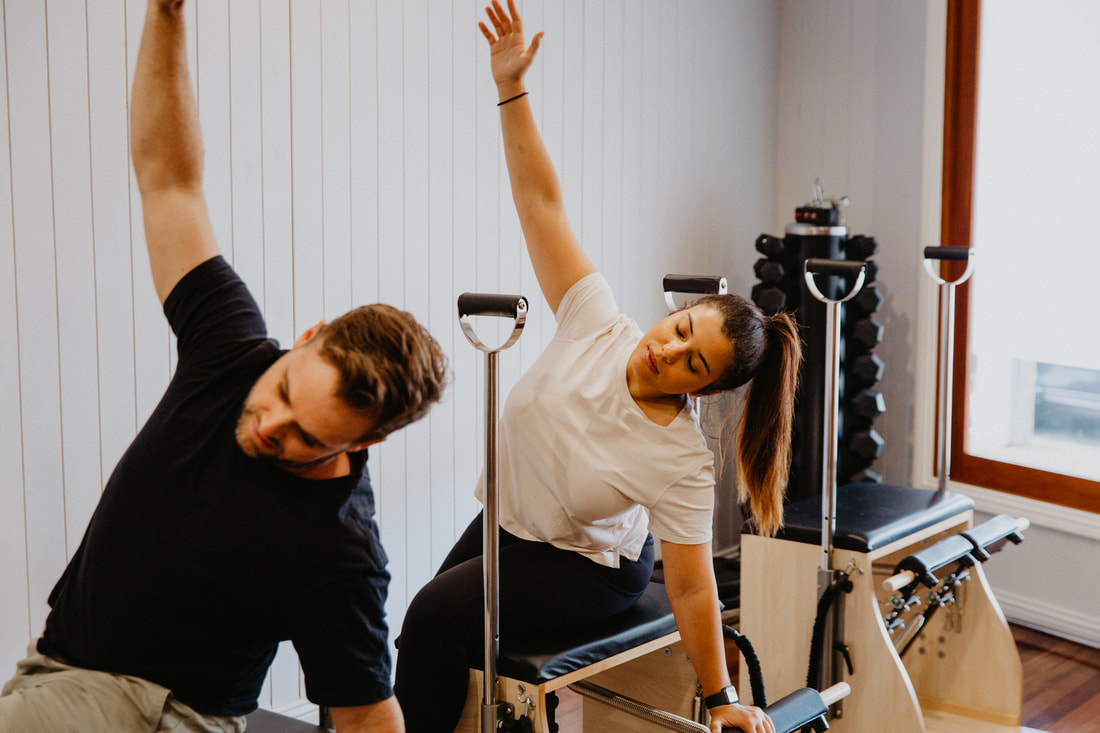Frequently asked questions about Pilates.
Here at Articulate we know that starting any new kind of exercise can be daunting. Still have questions? Just give us a call or pop us an email! We would love to talk to you about what's going on and the best way we can help. Call us during business hours on 07 3706 3407 or email us at [email protected] with questions or to request a call back.
PILATES FOR BEGINNERS
What is Pilates?
Pilates is a form of physical exercise that emphasises strengthening the core muscles, improving posture, balance and flexibility. It was developed by Joseph Pilates in the early 20th century and typically involves low-impact, controlled movements performed on mats or specialised equipment. The goal of Pilates is to improve physical strength, coordination, and overall physical fitness.
I've never done Pilates before. Is that ok?
Absolutely! We think it's always good to remember that every single person in our classes (including our instructors) were complete beginners at some point. We know that the equipment here is daunting, especially with all it's springs, attachments and moving parts. We don't expect you to know how to use it all, which is why we're here and why we keep our class numbers small! We'll help you every step of the way, and are here to keep you safe. Our instructors will guide and correct you as you go, to help prevent injury, as well as to help make sure you get the most out of every exercise.
Where should I start?
Most people start with our intro pack. We offer 3 classes for $55 (valued at $105) which is a great way to check out our different styles and teachers and see what you like best. We all tend to gravitate towards different teachers, so we recommend trying to book in to three different times if possible so you can experience the different teaching styles on offer. You can find our full Pilates Timetable here.
What do I need to bring?
Most people bring a bottle of water and a towel, but anything you need to exercise and be comfortable is great!
What should I wear?
Wear that same kind of outfit you would wear for any exercise session - whether that's shorts and a t-shirt, or leggings and a crop top. As there are exercises laying done (on front, back and sides) we recommend avoiding buttons or zippers wherever possible for comfort.
In Pilates participants often wear grippy socks too. These are like normal socks with little silicon beads on the bottom, and they can help to keep you a little safer by minimising the risk of slipping on the equipment or on the hard floor.
Pilates is a form of physical exercise that emphasises strengthening the core muscles, improving posture, balance and flexibility. It was developed by Joseph Pilates in the early 20th century and typically involves low-impact, controlled movements performed on mats or specialised equipment. The goal of Pilates is to improve physical strength, coordination, and overall physical fitness.
I've never done Pilates before. Is that ok?
Absolutely! We think it's always good to remember that every single person in our classes (including our instructors) were complete beginners at some point. We know that the equipment here is daunting, especially with all it's springs, attachments and moving parts. We don't expect you to know how to use it all, which is why we're here and why we keep our class numbers small! We'll help you every step of the way, and are here to keep you safe. Our instructors will guide and correct you as you go, to help prevent injury, as well as to help make sure you get the most out of every exercise.
Where should I start?
Most people start with our intro pack. We offer 3 classes for $55 (valued at $105) which is a great way to check out our different styles and teachers and see what you like best. We all tend to gravitate towards different teachers, so we recommend trying to book in to three different times if possible so you can experience the different teaching styles on offer. You can find our full Pilates Timetable here.
What do I need to bring?
Most people bring a bottle of water and a towel, but anything you need to exercise and be comfortable is great!
What should I wear?
Wear that same kind of outfit you would wear for any exercise session - whether that's shorts and a t-shirt, or leggings and a crop top. As there are exercises laying done (on front, back and sides) we recommend avoiding buttons or zippers wherever possible for comfort.
In Pilates participants often wear grippy socks too. These are like normal socks with little silicon beads on the bottom, and they can help to keep you a little safer by minimising the risk of slipping on the equipment or on the hard floor.
PRICING & PRIVATE HEALTH CLAIMING
How much are your Pilates classes?
We offer a range of options for our Pilates classes from paying casually to unlimited memberships. You can find our full Pricelist here. Essentially the more you come, the cheaper our classes become!
Can I claim Pilates classes on Private health?
Unfortunately with the private health reforms that occurred back in 2018/19 Pilates classes were removed from the extras section of most people's private health. Some funds do still offer rebates for healthy lifestyle choices such as gym memberships however, and we are more than happy to provide invoices for claiming this at any point.
We do also offer classes utlising the Pilates equipment known as Clinical Exercise classes, which must be run by a physiotherapist or exercise physiologist and are claimable on private health. You can find out more about our private health eligible Clinical Exercise classes here.
What's the difference between Pilates classes and Clinical Exercise classes?
Our Pilates classes are designed as general small group exercise classes for healthy populations, taught by Diploma Qualified Pilates teachers or some of our clinicians (physiotherapists and exercise physiologists) with a maximum of 6 attendees per class. Think of these more like gym classes. They are often run as a circuit, or attendees are broken into groups of similar levels. You might be doing the same as everyone else, or you might have some slight differences in what you do. These are group classes taught exactly as it sounds - as a group, however with our small class sizes you'll still get lots of individual attention as you move through the exercises.
Our Clinical Exercise classes are designed more as rehabilitation classes and are designed to help treat injuries or conditions. These are only run by clinicians (physiotherapists and exercise physiologists), and each person in the class will have different exercises to do designed to suit them. These are a maximum of 4 per class, with a high level of individualisation. These classes are suitable for everyone no matter what is going on.
We offer a range of options for our Pilates classes from paying casually to unlimited memberships. You can find our full Pricelist here. Essentially the more you come, the cheaper our classes become!
Can I claim Pilates classes on Private health?
Unfortunately with the private health reforms that occurred back in 2018/19 Pilates classes were removed from the extras section of most people's private health. Some funds do still offer rebates for healthy lifestyle choices such as gym memberships however, and we are more than happy to provide invoices for claiming this at any point.
We do also offer classes utlising the Pilates equipment known as Clinical Exercise classes, which must be run by a physiotherapist or exercise physiologist and are claimable on private health. You can find out more about our private health eligible Clinical Exercise classes here.
What's the difference between Pilates classes and Clinical Exercise classes?
Our Pilates classes are designed as general small group exercise classes for healthy populations, taught by Diploma Qualified Pilates teachers or some of our clinicians (physiotherapists and exercise physiologists) with a maximum of 6 attendees per class. Think of these more like gym classes. They are often run as a circuit, or attendees are broken into groups of similar levels. You might be doing the same as everyone else, or you might have some slight differences in what you do. These are group classes taught exactly as it sounds - as a group, however with our small class sizes you'll still get lots of individual attention as you move through the exercises.
Our Clinical Exercise classes are designed more as rehabilitation classes and are designed to help treat injuries or conditions. These are only run by clinicians (physiotherapists and exercise physiologists), and each person in the class will have different exercises to do designed to suit them. These are a maximum of 4 per class, with a high level of individualisation. These classes are suitable for everyone no matter what is going on.
INJURIES & LIMITATIONS
I currently have an injury or condition. Can I still join classes?
As injuries and conditions can range from little niggles to big body parts, that's sometimes a question we can't answer without talking to you more about it. While we are more than happy to try our best to modify in our general classes. for more complex issues that require significant modification we would recommend at a minimum completing a short check-in (20 minutes) with one of our physiotherapists first.
They'll be able to let you know whether general classes are suitable, or whether booking in to our clinician led (physiotherapist and exercise physiologist) Clinical Exercise Classes. These classes can accommodate a wide range of conditions and injuries and are claimable on private health.
We also have specific Prenatal Pilates and Postnatal Pilates courses to help accommodate bumps and postnatal rehab. We are happy to accommodate pregnant students in our general classes with modifications.
As injuries and conditions can range from little niggles to big body parts, that's sometimes a question we can't answer without talking to you more about it. While we are more than happy to try our best to modify in our general classes. for more complex issues that require significant modification we would recommend at a minimum completing a short check-in (20 minutes) with one of our physiotherapists first.
They'll be able to let you know whether general classes are suitable, or whether booking in to our clinician led (physiotherapist and exercise physiologist) Clinical Exercise Classes. These classes can accommodate a wide range of conditions and injuries and are claimable on private health.
We also have specific Prenatal Pilates and Postnatal Pilates courses to help accommodate bumps and postnatal rehab. We are happy to accommodate pregnant students in our general classes with modifications.
CLASS STYLES
What class style should I pick?
All of the classes here at Articulate will focus on both strength building and mobility work. If you're unsure what class suits best, simply pick the times that will fit into your schedule. Over time you'll get to know the teaching styles of the team here and find your favourite instructors!
All of the classes here at Articulate will focus on both strength building and mobility work. If you're unsure what class suits best, simply pick the times that will fit into your schedule. Over time you'll get to know the teaching styles of the team here and find your favourite instructors!
EQUIPMENT
What equipment do you use at Articulate?
Here at Articulate we have a full clinical set-up. We currently have four reformers, four wunda chairs, a cadillac (or trapezius table), a ladder barrel, a variety of small equipment (weights, bands, balls, rollers, blocks and straps) and of course Pilates mats for floor based work.
This gives us a much larger repertoire of exercises to choose from than simply having reformers alone. It enables our team to cater to a wider variety of bodies and conditions, and ensures that no two work outs will ever be the same!
Does the equipment make the classes harder?
Pilates equipment uses different coloured springs with different levels of tension to completely adjust the intensity of exercises. This works in both directions - it makes exercises both harder AND easier depending on what we are trying to achieve.
This makes Pilates gentle, effective and customised completely to you. If you haven't exercised for a while and are worried about not being strong enough - don't! It's all about finding the best workout level for you. We all have to start somewhere.
Here at Articulate we have a full clinical set-up. We currently have four reformers, four wunda chairs, a cadillac (or trapezius table), a ladder barrel, a variety of small equipment (weights, bands, balls, rollers, blocks and straps) and of course Pilates mats for floor based work.
This gives us a much larger repertoire of exercises to choose from than simply having reformers alone. It enables our team to cater to a wider variety of bodies and conditions, and ensures that no two work outs will ever be the same!
Does the equipment make the classes harder?
Pilates equipment uses different coloured springs with different levels of tension to completely adjust the intensity of exercises. This works in both directions - it makes exercises both harder AND easier depending on what we are trying to achieve.
This makes Pilates gentle, effective and customised completely to you. If you haven't exercised for a while and are worried about not being strong enough - don't! It's all about finding the best workout level for you. We all have to start somewhere.


